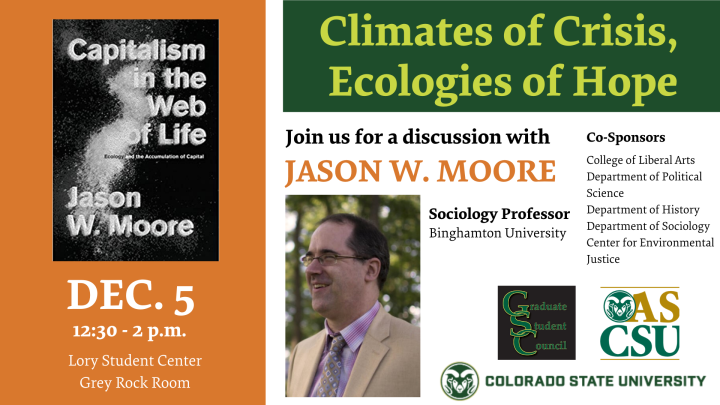
(CFP EXTENDED DEADLINE!) Climates of Crisis, Life, Power, and Planetary Justice in the Capitalocene
Climates of Crisis
Life, Power, and Planetary Justice in the Capitalocene
Binghamton University, USA, 7-8 February 2020
EXTENDED DEADLINE 18 DECEMBER, 2019
Call For Papers
Today’s climate crisis marks an unprecedented transition – and not only because of dramatically changing geophysical conditions, marking the end of 12,000 years of unusual climate stability. Climate change may not be everything, but it’s surely connected to everything — to modern agriculture and industry, to domination and exploitation, even to our ways of seeing and thinking about the world. This conference engages scholarly and popular concerns around climate change, global inequality, and economic growth from the standpoint of the Capitalocene. Understanding the modern world-system as capitalist world-ecology of power and re/production in the web of life, we explore the entangled historical geographies of biosphysical change, endless accumulation, Cheap Nature, and the colonial, racialized, and gendered dimensions of Cheap Power. While earth system scientists speak of a “state shift” in the biosphere – fundamental, abrupt and irreversible – it is increasingly clear that we need an intellectual state shift that moves beyond Society and Nature. Drawing on the world-ecology critique of Society and Nature as governing abstractions guiding recent – and longue durée – histories of modern rule and accumulation, this conference explores the possibilities for new syntheses. These synthesis point towards the differentiated unity of the geophysical and geohistorical. They suggest we might reconceptualize ongoing climate change, the transgression of “planetary boundaries,” and other geophysical turning points as co-produced in and through the geohistorical climate crisis defined by the Capitalocene’s planetary class divide, global patriarchy, and world color line.
We welcome proposals for papers and sessions that seek to extend and elaborate a broadly-conceived engagement with capitalism as a world-ecology of power, re/production, and life. We will consider papers relevant to the climate crisis even where climate change is not the central problematic.
The world-ecology conversation is global, transdisciplinary collaboration of scholars, artists, and activists. This conversation welcomes all forms of emancipatory interpretation, theory, and analysis committed to planetary justice for planetary life. Recognizing that no tradition or discipline holds all the answers, world-ecology cultivates a diversity of perspectives on human sociality in the web of life – past, present, and future. Common to these perspectives is a critique of Nature/Society dualism as a thoroughly modern cosmology and praxis of domination. A conversation and collaboration, world-ecology welcomes all who embrace the challenge of forging new relational modes of knowledge in an era of climate crisis.
Organized by the World-Ecology Research Group at Binghamton University in collaboration with the World-Ecology Research Network, with support from the Department of English, General Literature and Rhetoric, the Department of Sociology, and the Office of the Dean of Harpur College at Binghamton University.
A sample of nearly 400 scholarly articles, books, and other texts in the world-ecology conversation can be found here.
Important Dates:
December, 18 Abstracts Due
December 16-20 Notification Submitted
December 16 Registration Opens
January, 10 Registration & Fees Due
Submit your abstracts here.
For questions, or additional information, please contact the organizing committee at Worldecologyconferences@gmail.com.
Organizing Committee:
Diana Gildea, dianacgildea@gmail.com
Jacqueline Frazer, jfrazer2@binghamton.edu
Jason W. Moore, jwmoore@binghamton.edu
John O. Havard, jhavard@binghamton.edu